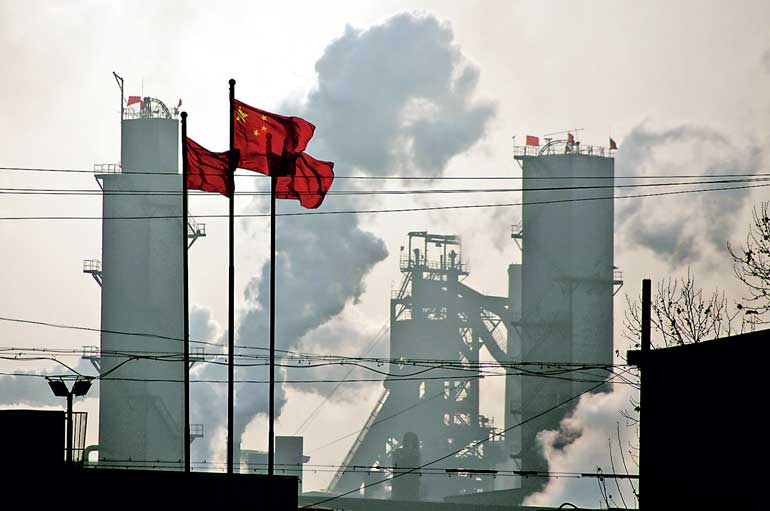Wednesday Feb 18, 2026
Wednesday Feb 18, 2026
Monday, 8 January 2018 00:00 - - {{hitsCtrl.values.hits}}
BEIJING (Reuters): China slightly trimmed its final 2016 gross domestic product figure after scaling back an initial estimate of the services sector, but kept the annual GDP growth rate unchanged at 6.7%, the statistics bureau said on Friday.

Chinese national flags flutter near a steel factory in Wu’an, Hebei province, China - Reuters/File photo
The National Bureau of Statistics revised the final 2016 GDP to 74.36 trillion yuan ($11.47 trillion), down 54.2 billion yuan from the preliminary number.
The 2016 growth rate of the world’s second-biggest economy remains unchanged at 6.7%, the statistics bureau said in a statement.
Final data from the bureau shows the services sector grew 7.7% in 2016 to 38.3 trillion yuan. The sector, which accounts for half of China’s GDP, expanded 7.8% in the bureau’s initial estimate to 38.4 trillion yuan.
The revisions were mainly due to small cuts in the bureau’s estimates for the size of the financial and tech sectors, which grew 4.5% and 18.1% in the final numbers, respectively, down from 5.7% and 22.2% in the earlier data release.
Growth estimates for manufacturing, agriculture, construction and real estate remain unchanged.
China’s 2016 GDP grew at its slowest pace in more than a quarter of a century as the government pushed through painful structural reforms in the economy.
GDP is expected to have expanded 6.8% in 2017, exceeding the government’s target of around 6.5%. But growth will likely slow to 6.4% this year, economists say.
Property investment and construction are expected to lose steam as more cities try to curb surging housing prices, while a government campaign against riskier lending pushes up borrowing costs and a crackdown on pollution hurts some factories.
The government will keep its GDP growth target at “around 6.5%” in this year, policy sources told Reuters.
BEIJING (Reuters) - China’s foreign exchange reserves rose to their highest in more than a year in December, blowing past economists’ estimates, as tight regulations and a strong yuan continued to discourage capital outflows, central bank data showed on Sunday.
Notching up their 11th straight month of gains, reserves rose $20.2 billion in December to $3.14 trillion, the highest since September 2016 and the biggest monthly increase since July. That compares with an increase of $10 billion in November.
Economists polled by Reuters had expected reserves to rise by $6 billion to $3.125 trillion.
Capital flight had been seen as a major risk for China at the start of 2017, but a combination of tighter capital controls and a faltering dollar helped the yuan stage a strong turnaround, bolstering confidence in the economy.
The yuan rose around 6.8% against the greenback in 2017, recovering from a 6.5% loss in 2016 and reversing three straight years of depreciation.
For the full year, China’s FX reserves rose $129.5 billion from $3.011 trillion at the end of 2016. That’s the first annual rise since 2014.
China’s foreign exchange regulator said in a statement on its website that it would keep the nation’s forex reserves and international balance of payments “balanced and stable” in 2018.
The country’s reserves dropped by nearly $1 trillion from a peak of $3.99 trillion in June 2014 to $2.998 trillion in January 2017 as it sought to shore up the yuan and reduce potentially destabilising capital outflows. But reserves have since climbed by $142 billion.
Despite the improved capital flow picture, China’s State Administration of Foreign Exchange has continued a clampdown on the movements of funds abroad. The regulator announced last month it would cap overseas withdrawals by people using domestic Chinese bank cards starting this year.
Some major global acquisitions by Chinese firms have also been put on ice by regulators, who fear they are really intended to disguise movements of capital offshore, though Beijing has maintained genuine investments will still be approved.
China’s central bank reported net foreign exchange buying for the third consecutive month in November, marking a policy victory for the authorities after a long battle to stabilise the yuan, although analysts say capital flows are likely to remain volatile as the economy slows.
Economists polled by Reuters expect the yuan to depreciate slightly this year if the dollar firms.
The value of gold reserves rose to $76.47 billion at the end of December, from $75.833 billion at the end of November, data on the People’s Bank of China’s website showed.